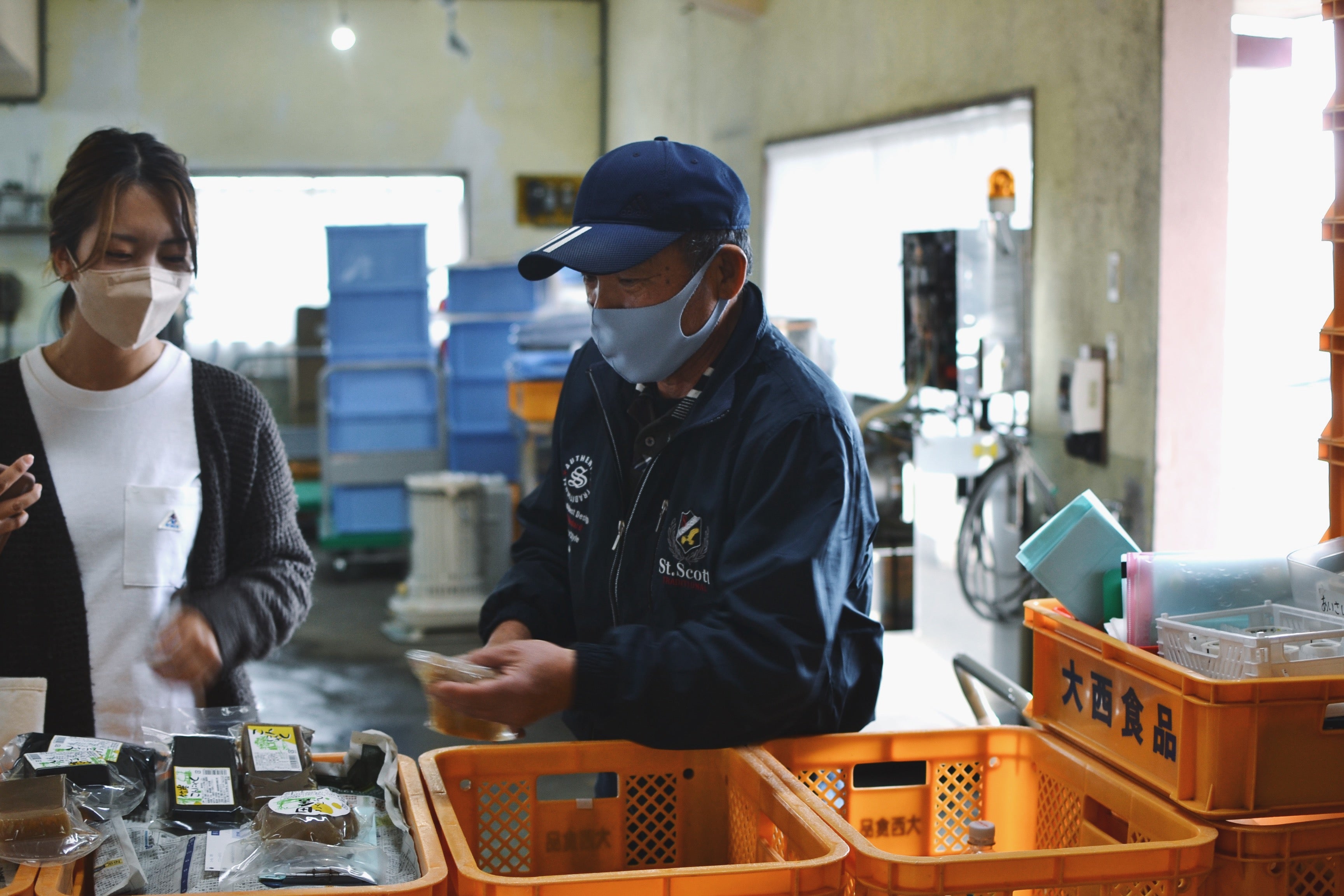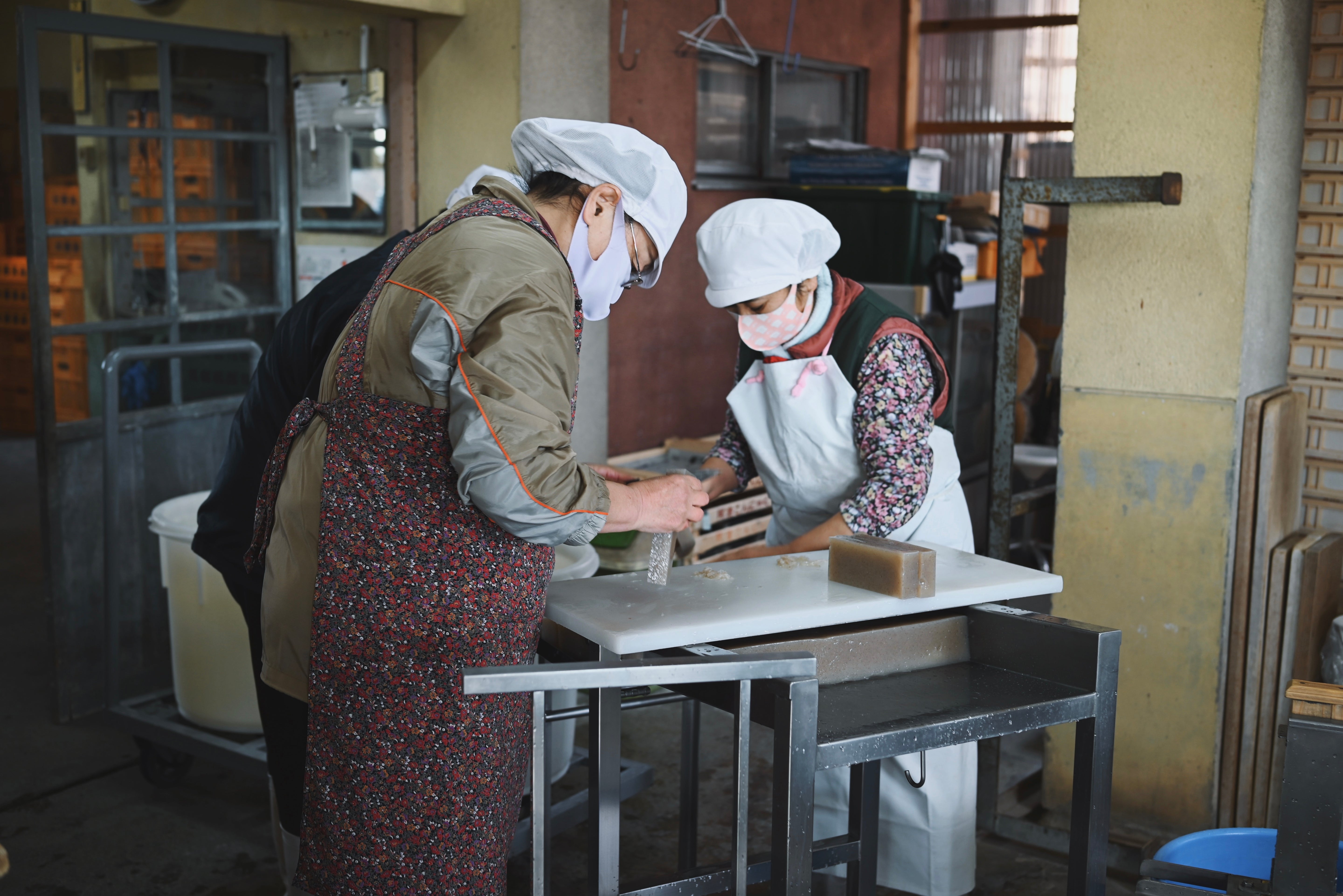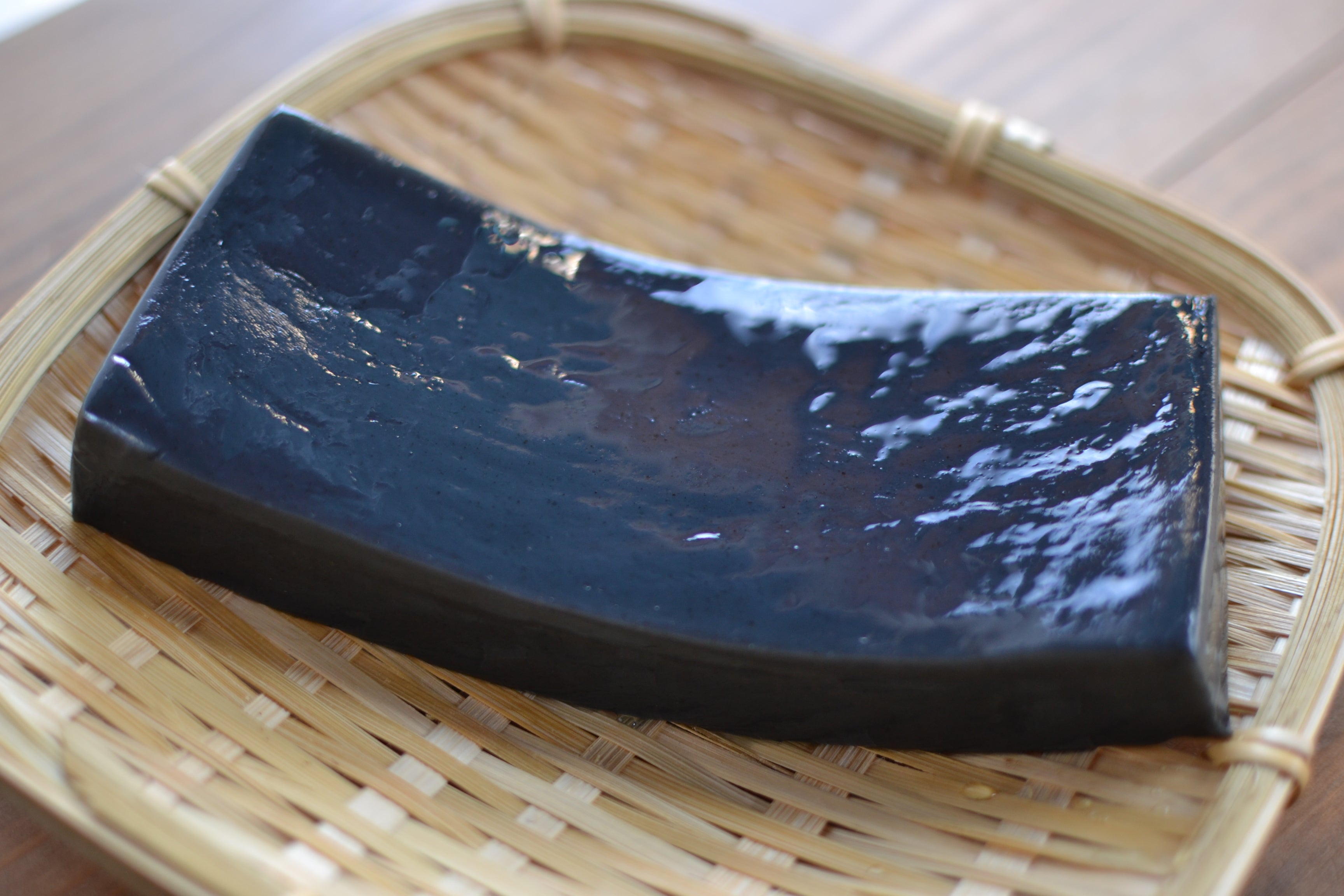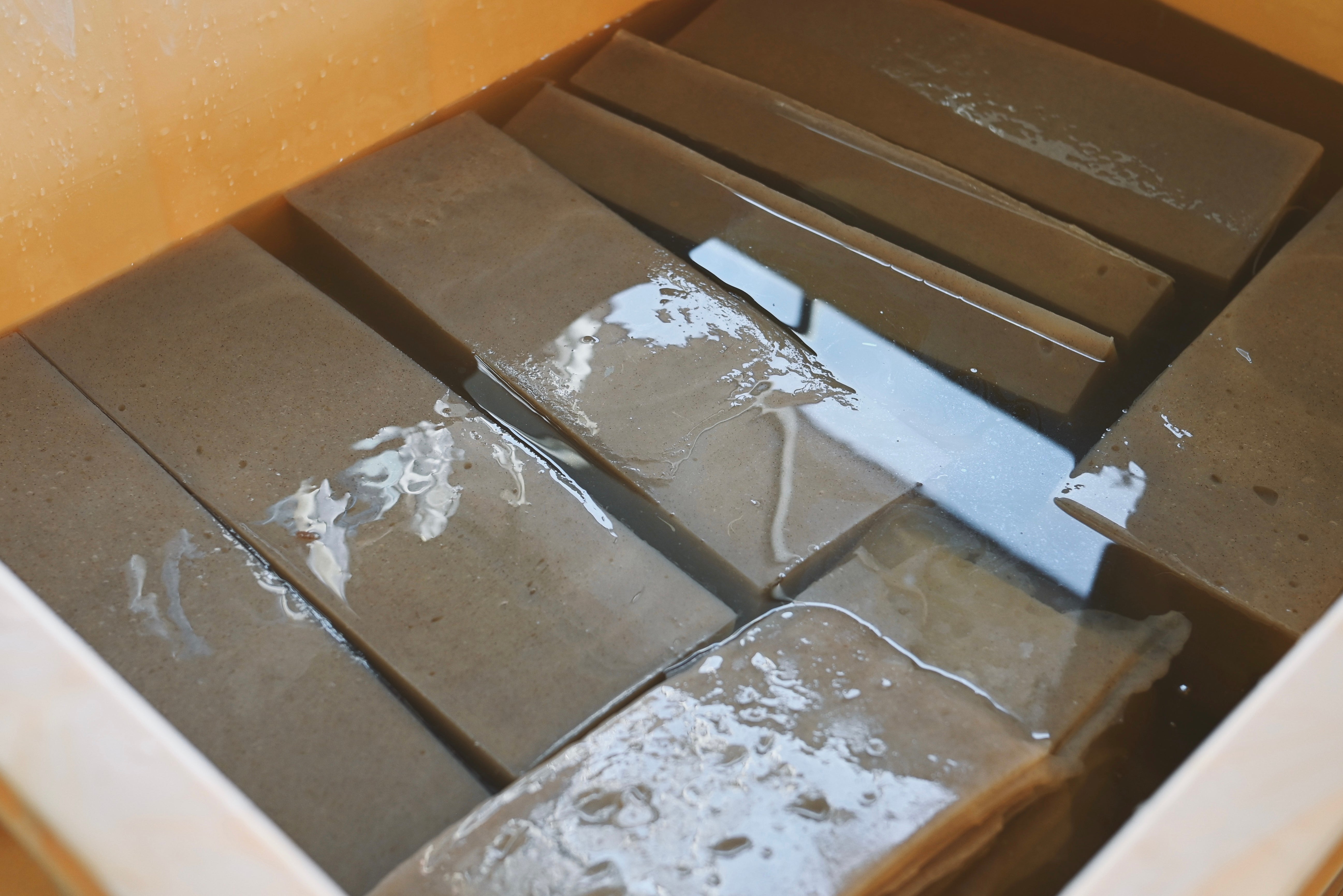Story
Onishi Foods
Soft and chewy konjac made by skilled craftsmen

Mr. Toshiaki Onishi, the third-generation president of Onishi Foods, always greets us with a warm smile. The company was founded in the early Showa period in Nakagawacho, Anan City, Tokushima Prefecture, and produces konnyaku that continues to be loved by locals.
Onishi Foods' konjac is made with three key priorities.
①Ingredients <br/>We only use carefully selected domestic ingredients, mainly konjac potatoes from Gunma Prefecture and locally produced.
② Odor <br/>In order to remove the odor of konjac, crushed scallop shells are used instead of the conventional calcium hydroxide (coagulant). This results in a taste that is easy to eat with almost no odor.
3) Texture <br/>Generally, 4 to 4.5 times as much water is used as konjac yam, but we deliberately use a ratio of 3 to 3.5 times. This creates a bouncy, elastic texture and less bitterness.


There are nine types of konnyaku made using traditional methods, all of which are equally delicious. The one that has been attracting particular attention is the "Bamboo Charcoal Konnyaku," which has been on sale since 2020.
This product uses local bamboo charcoal sourced from the Anan City Bamboo Charcoal Manufacturing Association and is a symbol of Anan, a treasure trove of bamboo forests.
Bamboo charcoal is rich in natural minerals and has been attracting attention in recent years as a healthy material that is also expected to have a detoxifying effect.
You may be surprised at how black it looks,
The bamboo charcoal absorbs the odor of the konjac, making it even easier to eat.
Awai Shoten stocks three products: "Sashimi Konnyaku," "Fresh Potato Konnyaku," and "Bamboo Charcoal Konnyaku."
Onishi Foods' konnyaku is perfect for stir-fries such as kinpira and mizutaki. It's also delicious when added to nikujaga (beef and potato stew).


![[Additive-free raw potato konjac] Low bitterness and traditional firm texture](http://awaishouten.com/cdn/shop/products/76d0c2ee987f4571542ffb168ce9ca14.jpg?v=1676259689&width=1566)
![[Additive-free raw potato konjac] Low bitterness and traditional firm texture](http://awaishouten.com/cdn/shop/files/DSC_2120.jpg?v=1713492361&width=3456)
![[Additive-free raw potato konjac] Low bitterness and traditional firm texture](http://awaishouten.com/cdn/shop/files/DSC_2160_e1fc771f-7a51-4f16-8cf0-32d43c1eddc1.jpg?v=1713492373&width=3298)
![[Additive-free raw potato konjac] Low bitterness and traditional firm texture](http://awaishouten.com/cdn/shop/files/DSC_21852.jpg?v=1713492384&width=3456)
![[Additive-free raw potato konjac] Low bitterness and traditional firm texture](http://awaishouten.com/cdn/shop/files/DSC_00292_3fc266e7-2ea7-45ec-9e0c-c84339d86f8f.jpg?v=1713492398&width=3456)
![[Additive-free raw potato konjac] Low bitterness and traditional firm texture](http://awaishouten.com/cdn/shop/files/DSC_0073_96d261f8-79a7-4b90-8ad6-91a6f35608cf.jpg?v=1713492398&width=3456)
![[Additive-free raw potato konjac] Low bitterness and traditional firm texture](http://awaishouten.com/cdn/shop/products/76d0c2ee987f4571542ffb168ce9ca14_114x144_crop_center.jpg?v=1676259689)
![[Additive-free raw potato konjac] Low bitterness and traditional firm texture](http://awaishouten.com/cdn/shop/files/DSC_2120_114x144_crop_center.jpg?v=1713492361)
![[Additive-free raw potato konjac] Low bitterness and traditional firm texture](http://awaishouten.com/cdn/shop/files/DSC_2160_e1fc771f-7a51-4f16-8cf0-32d43c1eddc1_114x144_crop_center.jpg?v=1713492373)
![[Additive-free raw potato konjac] Low bitterness and traditional firm texture](http://awaishouten.com/cdn/shop/files/DSC_21852_114x144_crop_center.jpg?v=1713492384)
![[Additive-free raw potato konjac] Low bitterness and traditional firm texture](http://awaishouten.com/cdn/shop/files/DSC_00292_3fc266e7-2ea7-45ec-9e0c-c84339d86f8f_114x144_crop_center.jpg?v=1713492398)
![[Additive-free raw potato konjac] Low bitterness and traditional firm texture](http://awaishouten.com/cdn/shop/files/DSC_0073_96d261f8-79a7-4b90-8ad6-91a6f35608cf_114x144_crop_center.jpg?v=1713492398)
![[Additive-free bamboo charcoal konjac] Detox your intestines with the adsorption power of charcoal](http://awaishouten.com/cdn/shop/products/35daea164f6c4513bfcceb9285cb0417.jpg?v=1676259551&width=1566)
![[Additive-free bamboo charcoal konjac] Detox your intestines with the adsorption power of charcoal](http://awaishouten.com/cdn/shop/files/DSC_21102.jpg?v=1713491956&width=3456)
![[Additive-free bamboo charcoal konjac] Detox your intestines with the adsorption power of charcoal](http://awaishouten.com/cdn/shop/files/DSC_2160_27d8839c-b991-4a05-a06f-555e89ea5681.jpg?v=1713491990&width=3298)
![[Additive-free bamboo charcoal konjac] Detox your intestines with the adsorption power of charcoal](http://awaishouten.com/cdn/shop/files/DSC_00292_2e66cdca-2a5f-43c2-9093-fd68938e94f5.jpg?v=1713491997&width=3456)
![[Additive-free bamboo charcoal konjac] Detox your intestines with the adsorption power of charcoal](http://awaishouten.com/cdn/shop/files/DSC_0073_7d7d7983-1ef6-44c6-835d-2dada66307e3.jpg?v=1713491998&width=3456)
![[Additive-free bamboo charcoal konjac] Detox your intestines with the adsorption power of charcoal](http://awaishouten.com/cdn/shop/products/35daea164f6c4513bfcceb9285cb0417_114x144_crop_center.jpg?v=1676259551)
![[Additive-free bamboo charcoal konjac] Detox your intestines with the adsorption power of charcoal](http://awaishouten.com/cdn/shop/files/DSC_21102_114x144_crop_center.jpg?v=1713491956)
![[Additive-free bamboo charcoal konjac] Detox your intestines with the adsorption power of charcoal](http://awaishouten.com/cdn/shop/files/DSC_2160_27d8839c-b991-4a05-a06f-555e89ea5681_114x144_crop_center.jpg?v=1713491990)
![[Additive-free bamboo charcoal konjac] Detox your intestines with the adsorption power of charcoal](http://awaishouten.com/cdn/shop/files/DSC_00292_2e66cdca-2a5f-43c2-9093-fd68938e94f5_114x144_crop_center.jpg?v=1713491997)
![[Additive-free bamboo charcoal konjac] Detox your intestines with the adsorption power of charcoal](http://awaishouten.com/cdn/shop/files/DSC_0073_7d7d7983-1ef6-44c6-835d-2dada66307e3_114x144_crop_center.jpg?v=1713491998)
![[Additive-free sashimi konjac] No need to remove the bitterness. Delicious with no peculiar taste.](http://awaishouten.com/cdn/shop/products/029d3a01a4b5c410ecfbb7252a608c83.jpg?v=1676259829&width=1566)
![[Additive-free sashimi konjac] No need to remove the bitterness. Delicious with no peculiar taste.](http://awaishouten.com/cdn/shop/files/DSC_2160_cf205c85-00fd-470f-af2a-c9b89330eaff.jpg?v=1713490950&width=3298)
![[Additive-free sashimi konjac] No need to remove the bitterness. Delicious with no peculiar taste.](http://awaishouten.com/cdn/shop/files/DSC_21132.jpg?v=1713490961&width=3456)
![[Additive-free sashimi konjac] No need to remove the bitterness. Delicious with no peculiar taste.](http://awaishouten.com/cdn/shop/files/DSC_00292.jpg?v=1713491152&width=3456)
![[Additive-free sashimi konjac] No need to remove the bitterness. Delicious with no peculiar taste.](http://awaishouten.com/cdn/shop/files/DSC_0073.jpg?v=1713491152&width=3456)
![[Additive-free sashimi konjac] No need to remove the bitterness. Delicious with no peculiar taste.](http://awaishouten.com/cdn/shop/products/029d3a01a4b5c410ecfbb7252a608c83_114x144_crop_center.jpg?v=1676259829)
![[Additive-free sashimi konjac] No need to remove the bitterness. Delicious with no peculiar taste.](http://awaishouten.com/cdn/shop/files/DSC_2160_cf205c85-00fd-470f-af2a-c9b89330eaff_114x144_crop_center.jpg?v=1713490950)
![[Additive-free sashimi konjac] No need to remove the bitterness. Delicious with no peculiar taste.](http://awaishouten.com/cdn/shop/files/DSC_21132_114x144_crop_center.jpg?v=1713490961)
![[Additive-free sashimi konjac] No need to remove the bitterness. Delicious with no peculiar taste.](http://awaishouten.com/cdn/shop/files/DSC_00292_114x144_crop_center.jpg?v=1713491152)
![[Additive-free sashimi konjac] No need to remove the bitterness. Delicious with no peculiar taste.](http://awaishouten.com/cdn/shop/files/DSC_0073_114x144_crop_center.jpg?v=1713491152)